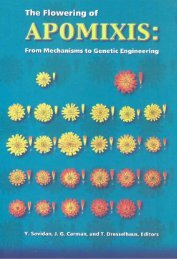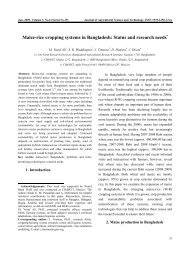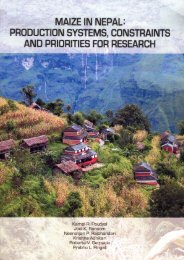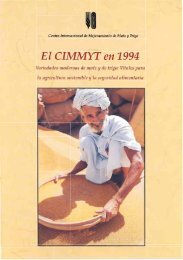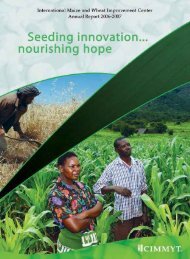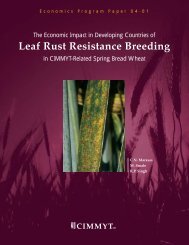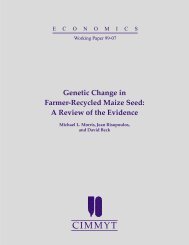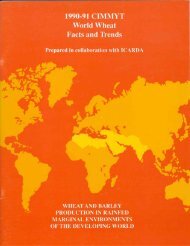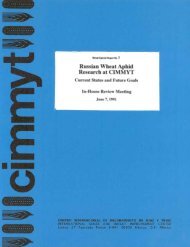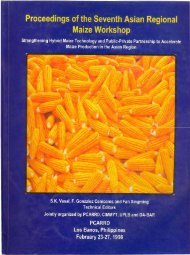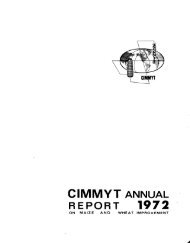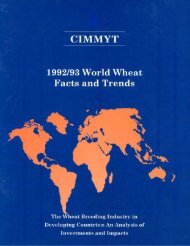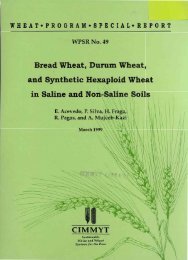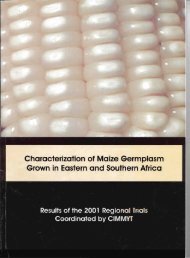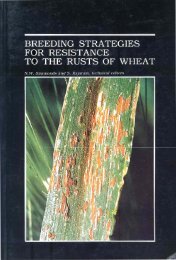Proceedings of the Fifth Asian Regional Maize Workshop - Search ...
Proceedings of the Fifth Asian Regional Maize Workshop - Search ...
Proceedings of the Fifth Asian Regional Maize Workshop - Search ...
You also want an ePaper? Increase the reach of your titles
YUMPU automatically turns print PDFs into web optimized ePapers that Google loves.
capabi 1ities<br />
Despite <strong>the</strong>se constraints, <strong>the</strong>re are opportunities for growth in <strong>the</strong> seed industry in<br />
developing countries. Growth could be optimized if unduly restrictive constraints are removed or<br />
modified. A few lessons can be gleaned from <strong>the</strong> history <strong>of</strong> <strong>the</strong> global seed industry over <strong>the</strong><br />
past 25 years.<br />
- Flexible dynamic management is critical to success;<br />
- Success is more likely when building onto an existing successful program;<br />
- Private sector commitment is directly related to a product's gross margin; <strong>the</strong> higher<br />
<strong>the</strong> margin, <strong>the</strong> greater <strong>the</strong> commitment;<br />
- seed growers are more involved and effective when <strong>the</strong>ir share in <strong>the</strong> pr<strong>of</strong>it is assured;<br />
- Repeat business is possible only if <strong>the</strong> farmer's return on investment is high ($3-$5<br />
for each $1 spent);<br />
- Strict quality assurance is indispensable for success;<br />
- capital intensive projects are <strong>of</strong>ten nei<strong>the</strong>r necessary nor appropriate (sc-called<br />
"white elephants") in <strong>the</strong> developing world;<br />
- seed production must be linked to seed demand in order to manage inventories properly;<br />
- A long term perspective is essential for success;<br />
- Timely availability <strong>of</strong> seed in areas <strong>of</strong> use in critical.<br />
Creating success<br />
While seed is a small part <strong>of</strong> total farming costs, it has greater influence on productivity<br />
than any o<strong>the</strong>r input. Most good farmers understand <strong>the</strong> value <strong>of</strong> high quality seed. They are<br />
willing to travel considerable distances, and are willing to buy in advance, to ensure <strong>the</strong>y get<br />
quality seed.<br />
Since most farmers in developing countries operate at a subsistence level, it has been<br />
said that <strong>the</strong>y lack <strong>the</strong> resources to utilize hybrid seed. There is indeed reluctance on <strong>the</strong> part<br />
<strong>of</strong> <strong>the</strong> farmer to pay high prices for hybrid seed. Traditionally, farmers have used open-pollinated<br />
varieties, not hybrids. The former are, <strong>of</strong> course, a much cheaper input.<br />
However, <strong>the</strong> experience <strong>of</strong> one <strong>of</strong> <strong>the</strong> leading seed companies in India (Proagro Seed<br />
Company ltd.), suggests that <strong>the</strong>re is reason to doublt this accepted wisdom about farmers in<br />
developing world. Except for 1993, Proagro's biggest constraint in <strong>the</strong> past five years has been<br />
to get enough hybrid seed produced to meet demand. Proagro's biggest constraint in <strong>the</strong> past five<br />
years has been to get enough hybrid seed produced to meet demand. Proagro's bottleneck has not<br />
been in creating demand, but ra<strong>the</strong>r in ensuring enough supply to meet demand for hybrid millet,<br />
sunflower, corn and sorghum seed. Approximately 1/3rd to 1/4th <strong>of</strong> <strong>the</strong> company's sales are made<br />
prior to even undertaking production. From <strong>the</strong> seed company's point <strong>of</strong> view, <strong>the</strong> importance <strong>of</strong><br />
advance bookings is that <strong>the</strong>y provide cash to make seed grower payments without getting highly<br />
indebted to banks.<br />
If a seed company is to become successful, farmers must share in <strong>the</strong> value added (farmer's<br />
benefit). The seed grower must benefit by earning more than what he would from a commercial<br />
crop. And, <strong>the</strong> seed comp~y must benefit by earning an acceptable return on investment. Farmers<br />
will pay for hybrid seed if it benefits <strong>the</strong>m regardless <strong>of</strong> its price premium. Farmers in <strong>the</strong><br />
developing world have centuries <strong>of</strong> crop growing experience, even if <strong>the</strong>y may lack <strong>the</strong> formal<br />
education <strong>of</strong> <strong>the</strong>ir colleagues in <strong>the</strong> developed world. Higher input levels are no disincentive to<br />
use <strong>of</strong> hybrids.<br />
Experience has shown industry is capable <strong>of</strong> providing quality seed to farmers as <strong>the</strong>y need<br />
it. Given <strong>the</strong> prominence <strong>of</strong> agriculture in <strong>the</strong>,developing world, hybrids could have <strong>the</strong> same<br />
catalytic effect on its seed industry in North America, Europe, and Japan.<br />
As Dr. sehgal could not attend <strong>the</strong> <strong>Workshop</strong> copies <strong>of</strong> <strong>the</strong> paper were distributed to all<br />
<strong>the</strong> participants well in advance. Dr. Hallauer coordinated <strong>the</strong> deliberations on this paper. He<br />
informed <strong>the</strong> group about <strong>the</strong> IPR laws as present in <strong>the</strong> U.S.A. Dr. Hess informed <strong>the</strong> group about<br />
<strong>the</strong> CGIAR's stand on <strong>the</strong> IPR. Dr. Hess also informed that CIMMYT would opt for patenting its<br />
material to prevent o<strong>the</strong>rs from patenting it.<br />
236



